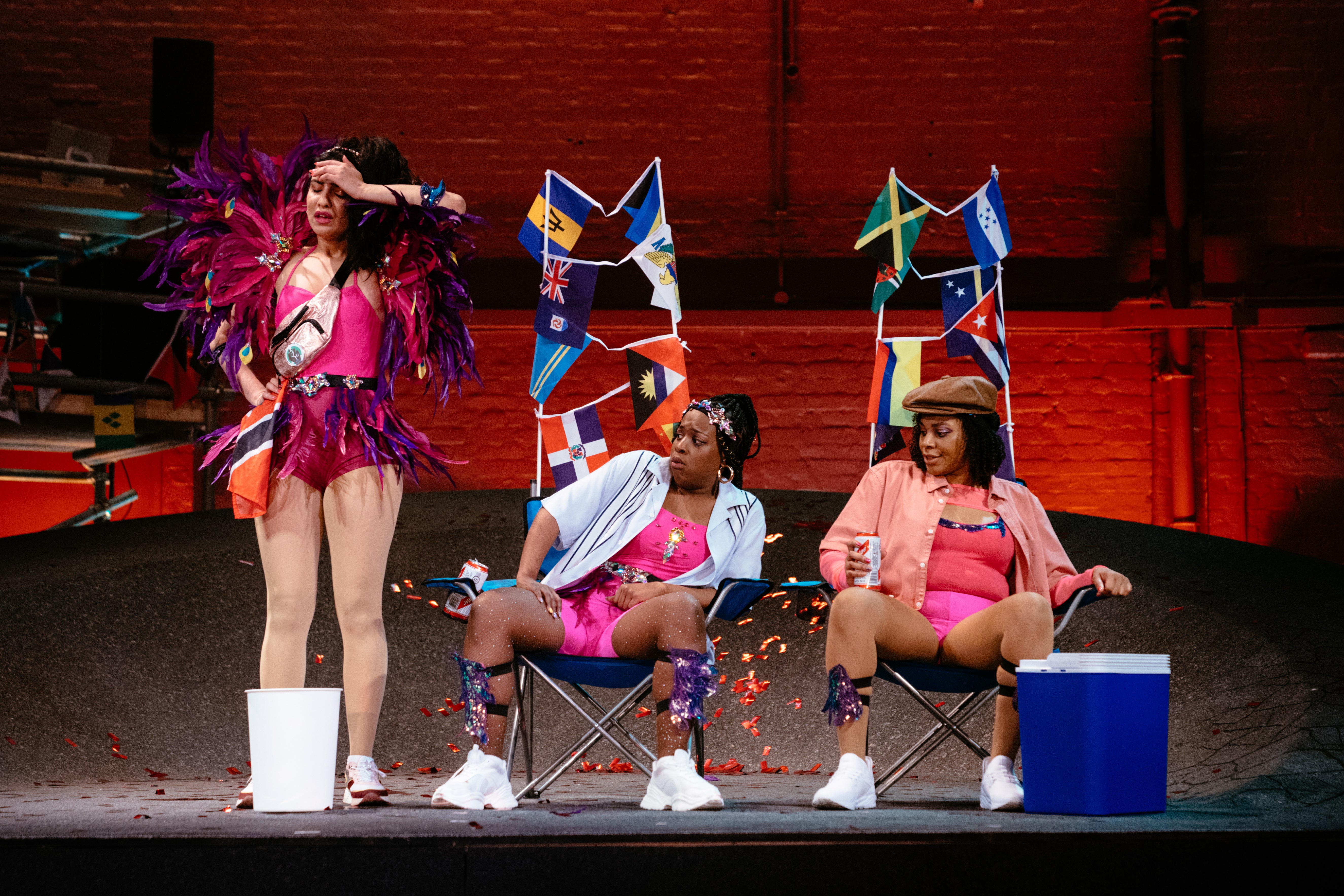‘Notting Hill Carnival is in my bones’: Yasmin Joseph on her exciting new play J’Ouvert
Playwright Yasmin Joseph’s debut show ‘J’Ouvert’ is a riotous explosion of colour and noise that’s bringing Notting Hill Carnival to the West End. She tells Isobel Lewis about her lifelong connection to the festival, how Black history is taught in the UK, and why we have to ‘interrogate’ spaces we love


Ask Yasmin Joseph about her childhood, and her mind races to Notting Hill Carnival. The London-born author and playwright remembers it as a sweltering cornucopia of colour and excitement, which spread right from her home to the streets. She recalls meticulously helping her mother – who was working at a youth club on Harrow Road – with the costumes; their bath was filled with tie-dyed T-shirts to sell. “I would wear my costume on the road and [my mum would] put me to sleep on top of the speaker and I’d literally just be there vibrating,” says the 29-year-old. “It feels in my bones in that way.”
Joseph’s own Carnival journey – as well as the wider Black-British experience – forms the basis of her new play J’Ouvert, being staged as part of Sonia Friedman’s Re:Emerge season at London’s Harold Pinter Theatre. This is a production full of vim: jewels glisten, music blasts. Balancing wit with pathos, it’s not only a decidedly British story, but also reflective of a wider carnival culture, with the show’s origins rooted in Joseph’s time spent at the Labour Day parade while living in New York.
At the heart of J’Ouvert are three young women – Black-British Nadine and Jade, and Indian Nisha – navigating the clashes of tradition and modernity, freedom and objectification at Notting Hill Carnival in 2017. The show deftly encapsulates both the magnitude of the event – for which 2.5 million people annually pour into the narrow west London streets – and the pressure-cooker environment it incubates.

J’Ouvert – which is also being recorded for BBC iPlayer – was first staged in 2019 at Theatre 503, a small space above a pub in Battersea. Depicting an event of such gargantuan scale was a challenge, but one that Joseph says mirrored the innovation of festival-goers. We see the leads multi-role, playing everyone from Jamaican elders to white attendees, and filling every available inch with their performances. Now in its larger space, the show has maintained the spirit of its fringe theatre run, but with more room to, in Joseph’s words, “stretch and breathe and to feel the kind of vastness and the epic nature of Carnival”.
A lifelong Carnival devotee, Joseph nevertheless doesn’t shy away from showing the “light and shade” of the festival, particularly when it comes to gendered violence. While the number of cases reported are often low, anecdotal evidence suggests that this is a problem that runs rife. Writing in gal-dem in 2018, journalist Charnte Williams said that she “can’t count” the number of times she has been groped, kissed or carried off at the festival, but the issue is rarely discussed by the media.
Joseph knows women who’ve been harassed at the carnival. Examining their lived experiences, she says, is the only way to “preserve [its] integrity”. “When you love something enough, you can interrogate it because you know that the good will always massively outweigh the bad,” she says. These issues are by no means exclusive to Carnival, but are seen anywhere “women desire to be free and express themselves and dress in certain ways. It happens at Glastonbury; it happens across the board.”
Female attendees, with their bright, intricate outfits, are the “spectacle” of the festival, but the way these scenes are depicted on stage is just as innovative. With the female actors multi-roling as male aggressors who disrespect the women of Carnival, J’Ouvert allows them to tell these stories on their own terms. “There’s something about, in a moment where you are disempowered, having the power to give us your rendition of the person who poses a threat to you,” Joseph says. “We can’t change the people who attend [the carnival] but we can tell you how we see them and how they impact us.”
For as long as she’s attended, Carnival has always brought up these big ideas for Joseph, including those around her own history. As she points out, Black history in the UK is often taught through an American lens, with projects such as Steve McQueen’s “amazing” BBC series Small Axe only just beginning to tell these stories. “Carnival definitely is a time that brings a lot to the surface for me… why Carnival, why it matters, where it came from and what it seeks to rise up against,” she says.

The topics J’Ouvert rails against – convention, class struggle, gentrification – carry a different weight now that the show is being performed in an “ornate and gold and grand” West End theatre. Joseph says she always wanted the production to challenge the space and audiences simultaneously. In one scene, Nadine discusses the logistical struggle of peeing at Carnival, choosing to do so on a terraced house with boarded-up windows that’s worth millions. On the Pinter stage, the actor squats down by the golden beams, an act of bodily rebellion against the spaces that have traditionally kept stories like these out.
Above all, Joseph wants Black audiences to come and see J’Ouvert and feel like they “have every right to be there”. But she’s aware it’s a big ask. “I’m grateful for every single person that I wrote this play for that engages with it in this space,” she says. “I’m comfortable knowing that the people I want to see the play might … need the nods of people from their community to watch first and say, ‘Actually, this is worth your time.’” Besides, she adds with a laugh, if “no one else comes, my mum will be there most nights”.
‘J’Ouvert’ runs at the Harold Pinter Theatre as part of SFP’s Re:Emerge season until 3 July



Join our commenting forum
Join thought-provoking conversations, follow other Independent readers and see their replies
Comments